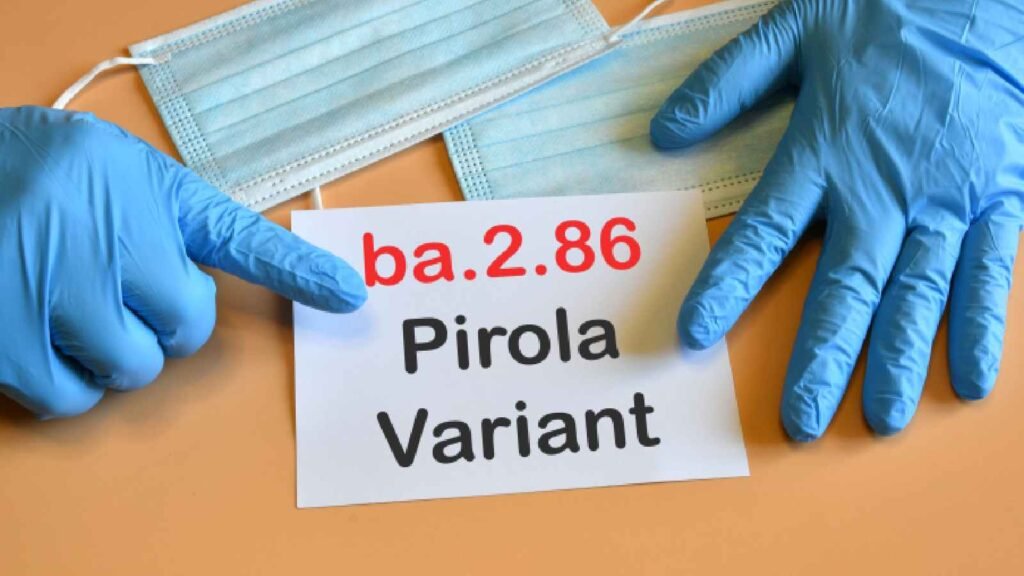[ad_1]
The highly transmissible variants of Covid-19 had the world reeling for its safety. After numerous efforts, we were able to leave the danger behind. However, the microscopic villain is not ready to back out. Now, the emergence of the BA.2.86 Covid variant, nicknamed Pirola, has prompted concerns among health experts because it contains high mutations and is spreading fast.
The Pirola variant is believed to exhibit a unique combination of mutations in the spike protein, which has raised fears about its potential impact on vaccine effectiveness and transmissibility. Since there are so many speculations about whether or not it is dangerous, Health Shots asked experts to shed some light on the Pirola Covid-19 variant.

What is the Covid-19 variant Pirola?
The World Health Organization (WHO) confirmed in its September epidemiological update that it is keeping an eye on seven variants of SARS-CoV-2, including BA.2.86 or Pirola. This sub-variant was first reported in Denmark in late July. The global health authority recognised BA.2.86 as a novel variation under surveillance.
“Pirola or BA.2.86 is one of the lineages of the Omicron variant of Covid-19 virus. It is currently on the WHO list of ‘variants under monitoring’. The cases of Pirola are in Israel, Denmark, and the US. It is more dangerous than the previous variants as it has more than 30 spike protein mutations that differ from the XBB 1.5 variant of Omicron. This gives it the capacity to be immune evasive and highly transmissible,” explains Dr Charu Dutt Arora, Infectious Disease Specialist and Consultant Physician at AmeriHealth, Asian Hospital.
“The Pirola variant, which is a variant of Omicron XBB, has more than 30 mutations so it has to be watched and can cause a high number of cases. It’s expected to be mild. Yes, there is an uptick in Covid-19 cases, but it is important to recognise the danger by genome testing and take precautions,” adds Dr Hemalata Arora, Senior Consultant, Internal Medicine, at Nanavati Max Hospital.
What are the symptoms of the Covid-19 variant Pirola?
While only a few cases of the Priola variant have been detected across the globe, there have been no deaths reported so far. There have been no reports of any cases of Pirola in India, but the experts are saying that the symptoms of this variant are similar to the initial symptoms of other COVID-19 variants:
- Runny or stuffy nose
- Fever
- Cough
- Fatigue
- Sneezing
Is Covid-19 variant Pirola a threat to India?
While the Pirola variant is spreading in several countries, it has not reached India yet. There is sure an uptick in cases, but proper genome testing to take precautions and taking an Omicron-specific booster that’s now available may reduce the risk of infections, says Dr Arora.
Select Topics of your interest and let us customize your feed.
PERSONALISE NOW
India has witnessed multiple waves in the past three years, and there is no need to panic, adds Dr Dutt. A majority of population is vaccinated so they are protected with their natural and passive antibody-induced immunity.
It is crucial for everyone to get vaccinated and practice proper precautions. Vulnerable populations, including children, elder citizens, immunocompromised, or those suffering from co-morbid diseases should follow appropriate measures to avoid problems. With monsoon around and flu season coming, it is important to follow precautionary measures to control the spread of the disease, adds the experts.

Keep your guard up against new Covid-19 variants
The Pirola variant of Covid exhibits a unique combination of mutations in the spike protein, which has raised fears about its potential impact on vaccine effectiveness and transmissibility. Scientists are working diligently to understand the variant’s characteristics and assess its true threat level. However, the threat is not believed to be too serious for India as of now as no cases of the variant BA.2.86 have been reported yet.
However, this a reminder that the fight against the coronavirus pandemic is not over. While the stark decline in the cases may have made people overlook the need for continued vigilance, it is vital that we pay attention to taking precautions. We must stay adaptable and resilient in the face of evolving challenges in our battle against Covid-19.
[ad_2]


6 Comments
Professional maintenance cleaning, maintains our home beautifully. This is the best investment. Appreciate the reliability.
Dry Cleaning in New York city by Sparkly Maid NYC
Với giao diện mượt mà và ưu đãi hấp dẫn, MM88 là lựa chọn lý tưởng cho các tín đồ giải trí trực tuyến.
iwin – nền tảng game bài đổi thưởng uy tín, nơi bạn có thể thử vận may và tận hưởng nhiều tựa game hấp
Khám phá thế giới giải trí trực tuyến đỉnh cao tại MM88, nơi mang đến những trải nghiệm cá cược thể thao và casino sống động.
Tham gia cộng đồng game thủ tại Go88 để trải nghiệm các trò chơi bài, poker phổ biến nhất hiện nay.